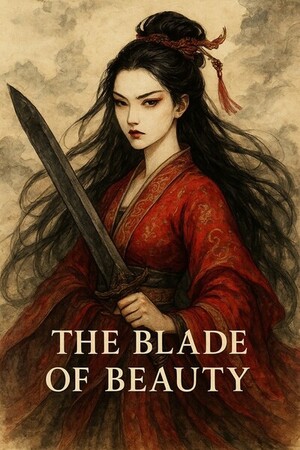Chapter 3:
Bai xue zhi
I, a Hermaphrodite, Live by Taking Lives
Mist swirled, and countless images flashed by, so many that my eyes swam. I steadied myself and fixed my gaze on a single wisp of smoke, reaching out to seize it. It was soft—almost like spun sugar.
I tugged hard. Nothing happened.
Impossible!
Master had taught me: once you grasp the thread of cause and effect, you must plunge into the world the thread leads to at once, or the line will vanish. The thread's light was already dimming; panic rose in my chest. Could it be that after a decade of toil I would fail for lack of strength?
At that moment a hand fell upon the back of mine and gripped it. A voice whispered in my ear: “Let me help.”
It was Gongsun Bai.
No time for speech. We pulled together. The air shuddered; a vortex opened. From the brazier a red light flared, and a path appeared—the passage into Qinyan’s consciousness. The gateway would last but a moment. I planted my heel in Gongsun Bai’s rear and kicked him into the whirl, then dove in after him.
When the vertigo cleared, the room had emptied. Only a sleeping woman remained, a tear still resting at the corner of her eye.
Bosuo — the Art of Causality.
Cause and effect determine all. The cause is set and may not be changed; the effect, if not yet born, may still be guided.
What we entered was merely Qinyan’s “cause”—a memory sealed in her mind. Though it was her recollection, to us it played out as a living, breathing scene.
It was a bitter winter. Dead grass stretched to the horizon.
The wind bit deep; the people wore but thin coats and shivered as they walked.
Suddenly two shadows fell like meteors and crashed into a haystack in a poor yard. Those two were Gongsun Bai and I.
Having never used Bosuo in earnest, I was clumsy. I knew only that seizing the smoke let one enter, but not how to land. Thus we tumbled headfirst from the sky. Gongsun Bai, for all his skill—shadowless kicks and flying steps at the ready—had no time to show them off; I had flung him in.
Thud!
Gongsun Bai plunged into the straw. Before he could lift his head, I came down upon his back.
“You—” he sputtered, straw clinging to him. I shoved his head back into the heap and whispered, urgent and strange: “Don’t ask. Don’t speak. Don’t lose your temper. This place is a construct; a careless move might collapse it.”
The realm was not so fragile, but better to frighten him than have him take revenge.
He froze, then muttered, “Is this not an effect-realm? Usually if the host does not break, how could it fail?”
He knew his craft well. I reddened but replied, forcing a smile: “You know part, not all. The host matters, yes, but so does the conjurer. If I, the maker, falter, the scene might crumble. Suppose you spooked me into despair—what then?”
He frowned, straw shaking from his brows.
A sound ahead pulled our attention. From a thatched hut came the crack of a whip. We crept forward and peered in. A stout man was thrashing a frail girl with a vine. She was some eight or nine years old, rags on her back, hair unkempt, yet her eyes shone like bright coals and she refused to bow.
“The master says I have talent; that I am meant to cultivate. I will go study the Way!” she cried.
Outside, I told Gongsun Bai in a low voice, “This is woven from Qinyan’s memory. All here has already occurred. We cannot change what once was; we are but witnesses.”
He glanced down, displeased. “But the blows feel real. Are we to do nothing?”
“This is the power of Bosuo,” I said. “It materializes a memory. Think of me as an artist who paints the most intimate dream. I could paint your beloved—full and beautiful—and she would live upon the paper. You could see and touch the image, yet it remains pigment and silk, not flesh. So it is with these scenes.”
A moment later the girl burst from the hut, hands to her face, calling, “Master! Master!” The man chased her, carrying two small children who wailed, “Sister! Sister!”
She trembled, then clutched the children and sobbed, tears mingling with grief and fury.
I understood. This was the “immortal affinity” she had spoken of. She could have left that cruel household to cultivate the immortal path, but she had stayed for father and siblings.
As I watched, the scene leapt forward. Winds whipped; the hut tossed; a sapling grew into a shade-giving locust tree. The crying child had become a girl of twelve or thirteen, poised and slender.
“What’s happening?” Gongsun Bai asked in wonder.
“Time’s line surges,” I said. “Bosuo skips the trivial and seeks the key moments.”
We rubbed our eyes. Then a powdered woman swept in, followed by two burly men. They burst through the door and soon a terrible scream came from within. The woman sashayed out, the men bearing a sack that writhed from inside. Qin Yan’s father followed, bargaining in a small voice.
The hag laughed, “A little more and it’s yours.”
They haggled—one coin, two coins—and the sack’s sounds turned to shrieks. At last a brute punched the bag and roared, “Enough bargaining! Your father has sold you!”
Silence fell from within the sack.
The scene changed again. We stood before a three-story house—carved pillars, dragons and phoenixes—above the gate a red board proclaimed Spring Breeze Pavilion. This was the famed quarter of flowers and wine.
Every celebrated courtesan has a wretched past; the world remembers only their later splendor, not the misery of the road. Qin Yan had been sold to the Pavilion and renamed a lowly maid. Once called by a common name, she became “Xiao Yu” under the hand of the leading courtesan, Bai Xuezhi.
Bai Xuezhi was fair as frost and cruel as winter; she loved to lash her girls. Many maids fled or died beneath that whip. Yet some vulgar patrons sought punishments, queuing to be struck.
Thus Xiao Yu’s days grew bitter. Barely twelve, her beauty provoked envy and beatings, and she bore them in silence, staring with those dark, unbowed eyes until her tormentors flinched.
On one occasion, having broken Bai Xuezhi’s hairpin, she was beaten and sent to hard labor in the kitchen. Cold and hunger stole upon her; she shrank to skin and bone, cheeks hollow, lips cracked. The kitchen women accused her of laziness and beat her more. A heel struck her back and she fell, unable to rise.
All night she lay upon the chill floor. Men expected her to die there—her candle burned low. As the hours ticked by, she stirred, rose unsteadily, and staggered to a well. People thought she might throw herself in, but she did not. She lowered a bucket and hauled up a half measure, then plunged her head and drank and drank.
She was starved. So starved that cold well water would fill her belly. I watched as her gut swelled, and then—on the second bucket—she vomited, and the stream was yellow. She collapsed upon the filth, bone and breath sapped from her.
Would she die? Even knowing the outcome, I felt my chest tighten. Gongsun Bai’s brow creased; his hand hovered near his waist as if to draw.
Then white feet appeared in the moonlight. Bai Xuezhi, all beauty in moonlit powder, held aloft a steamed bun and taunted, “Hungry?”
The bun fell to dust. Xiao Yu crawled like a worm, seized it, nibbled grain by grain. She ate so slowly one bun took an hour. The indignity was unforgettable.
“If you were she,” I asked, “would you eat?”
“Why not?” Gongsun Bai answered. “Pride has no place when hunger is the foe. One must eat to live and live to seek vengeance. She understood that.”
Half a year later, fate turned.
Xiao Yu kept her head down and served, and Bai Xuezhi grew lax. Mid-Autumn arrived and Spring Breeze Pavilion staged its annual moon festival—ladies as heavenly maidens, Bai Xuezhi as Chang’e. But on that night Bai Xuezhi vanished.




Please sign in to leave a comment.